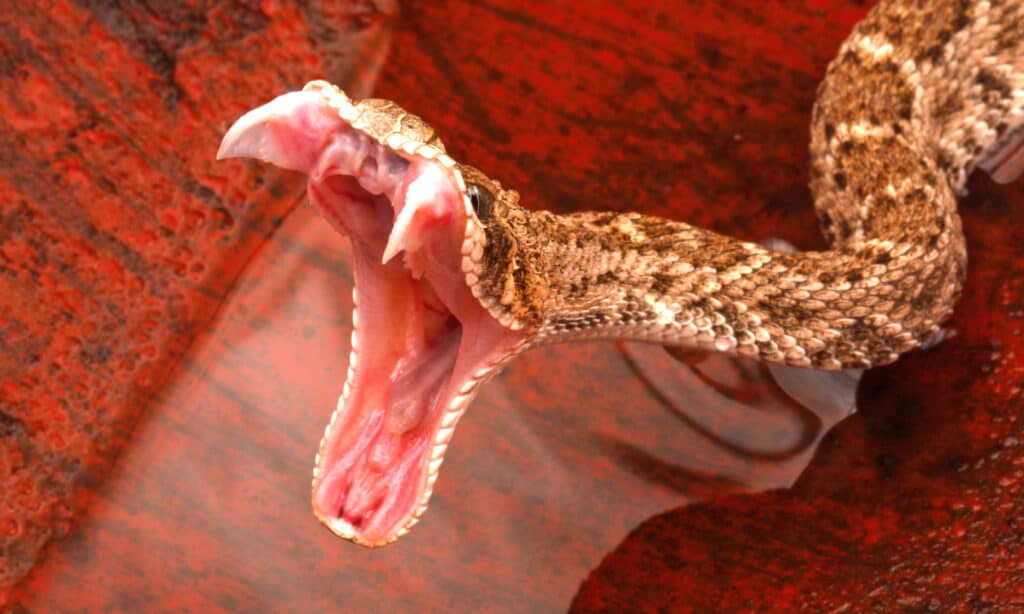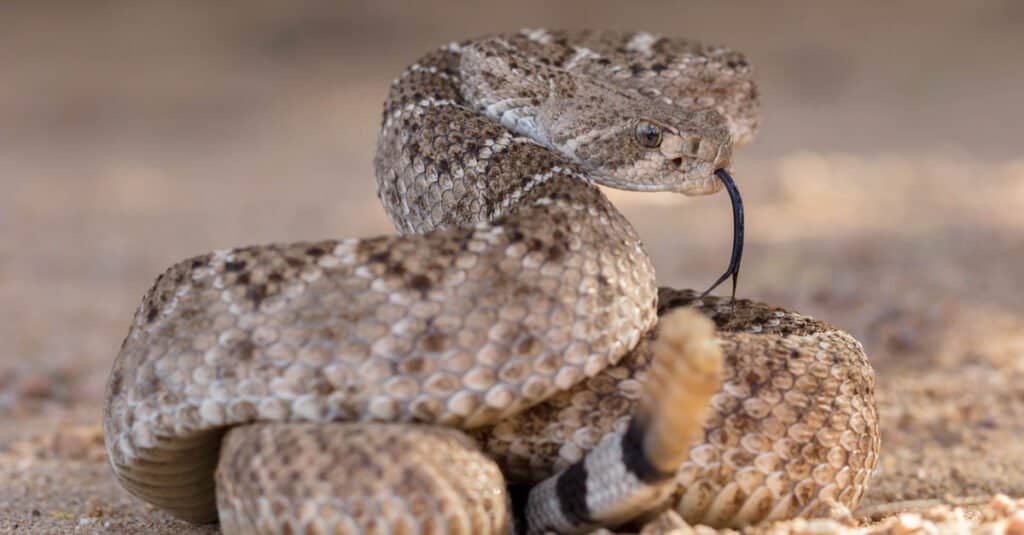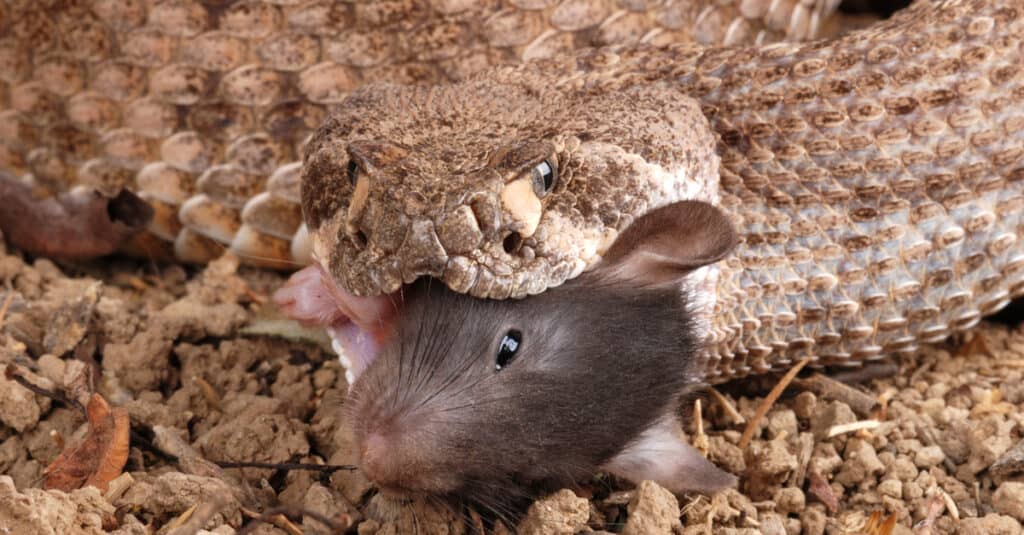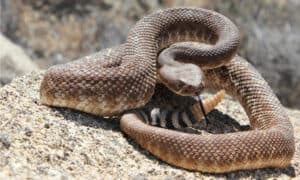This guy was not invited to the pool party! In this clip, we get to see a snake relocation expert find a two-and-a-half-foot-long western diamondback rattlesnake in a lovely Arizona garden.
Watch the Impressive Footage Below
However, as the expert points out, even small rattlesnakes still have venom and are a danger to the residents and their dogs.
He gets transferred into a secure plastic container as the onlookers debate whether he is ‘disgusting’ or ‘cute’. Rattlesnakes divide public opinion!
Do Rattlesnakes Bite Dogs?

If your dog is bitten by a
rattlesnake
, get them to a vet right away
©hedgehog94/Shutterstock.com
Western diamondback rattlesnakes are a type of pit viper and are found in the southwestern United States and northern Mexico. They like arid desert and semi-desert conditions and are found in areas where there are hiking trails. However, they also seek shelter (and potentially food) in people’s gardens and even in their homes. This means that they will inevitably encounter pet dogs!
When you are out hiking, many dogs like to investigate the very places where rattlesnakes like to hide out. These are tall grass or bushes, holes, spaces under rocks, or in stacks of wood. Rattlesnakes also bask out in the open and are well camouflaged so it would be easy for a dog to run over them.
The snake’s first response will be to warn with a rattle but if that does not work, or if the dog is already standing on them, they will bite! Studies have shown that pit vipers are responsible for an estimated 150,000 bites annually of dogs and cats in the US alone. Dogs are twenty times more likely to be bitten than a human and that is because they sniff around in areas where the snakes like to hang out! Most bites are reported between April and mid-October.
What to Do if a Rattlesnake Bites Your Dog

Rattlesnake bites can be really bad, it’s important to seek medical assistance as soon as possible if bitten.
©iStock.com/johnaudrey
If you saw the bite take place, you already have the information that you need. However, if you didn’t see the incident or the snake, you can diagnose a snake bite from some typical symptoms. There will probably be two puncture wounds on the skin with localized swelling, bleeding, and sensitivity.
Your dog will probably yelp and then be limp, if the bite is on a limb, and they will not want you to touch the area because it will be painful. You may also notice abnormal salivation, vomiting, and diarrhea. The more advanced/serious cases can have paralysis and/or black and blue tissue damage (necrosis).
You need to pick up your dog and carry them to get veterinary treatment as quickly as you can. Prompt treatment saves dogs’ lives!
What is the Normal Range of the Western Diamondback Rattlesnake?

The Western Diamondback rattlesnake is found across the U.S. Southwest.
©Alexander Wong/Shutterstock.com
The western diamondback rattlesnake is a venomous species of snake found in the southwestern United States and Mexico. It is a member of the Crotalinae family and amongst its most widespread and familiar members.
Their natural habitat consists of dry, rocky, and open areas that are usually warm and sunny. They are commonly found in deserts, grasslands, and scrubby areas. They are most commonly seen in Texas, New Mexico, Oklahoma, and Arizona.
Western diamondback rattlesnakes are usually 3 to 5 feet long, typically grey or brown, with distinctive diamond-shaped patterns along their spines. They have a wide triangular head with a distinctive rattle at the end of their tail, which allows them to make a loud buzzing sound when disturbed.
The Size of Western Diamondback Rattlesnakes

The western diamondback rattlesnake is vital to rodent control.
©Audrey Snider-Bell/Shutterstock.com
Western diamondback rattlesnakes (Crotalus atrox) are a species of venomous snake native to the United States and Mexico. They can vary widely in size, with the average length ranging from three to five feet. However, some specimens have been known to reach up to eight feet in length, making them some of the largest rattlesnakes in the world.
The largest Western diamondback rattlesnake recorded was found in Texas in 2012. It measured 8 feet, 8 inches in length, and weighed 15 pounds. This is believed to be the largest specimen of the species ever found, though there is no scientific evidence to back it up.
Western diamondback rattlesnakes are solitary creatures, and they can live for up to 20 years in the wild. They are often found in deserts, grasslands, and open woodlands, where they feed on small mammals and birds. They are also known to be wary and aggressive when disturbed.
Due to their large size and the potency of their venom, Western diamondback rattlesnakes are considered a serious threat to humans and pets, and they should be avoided at all costs. If you encounter one, it is best to slowly and carefully back away and leave the area.
The photo featured at the top of this post is © iStock.com/Banu R
Discover the "Monster" Snake 5X Bigger than an Anaconda
Every day A-Z Animals sends out some of the most incredible facts in the world from our free newsletter. Want to discover the 10 most beautiful snakes in the world, a "snake island" where you're never more than 3 feet from danger, or a "monster" snake 5X larger than an anaconda? Then sign up right now and you'll start receiving our daily newsletter absolutely free.
Thank you for reading! Have some feedback for us? Contact the AZ Animals editorial team.







